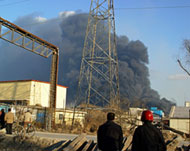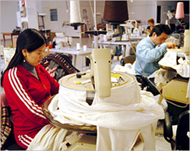China’s boom takes toll on safety
China’s industrial production has been expanding rapidly to fuel the country’s fast economic growth but safety standards are not keeping up, often with disastrous consequences, experts say.

With the fastest growth of any major economy, China‘s appetite for all sorts of material – from paint and plastics to coal – is insatiable, fuelling ramped-up production in many sectors.
Unlike in the 1960s or 1970s, production units have become profit-focused, but are neglecting upgrades in management, staff and infrastructure, experts said on Friday.
“The bottom line is the Chinese are inexperienced in doing something in a hurry. That leads to over 100,000 people dying in industrial accidents every year,” said Andy Xie, chief Asia Pacific economist for Morgan Stanley.
“When you spend so rapidly, you lack skilled workers and good management,” Andy said.
Safety sacrificed
Government statistics show 136,755 people died in work-related accidents last year, including factory accidents, but independent analysts believe the true figure is far higher as many mishaps with few deaths go unreported.
The explosion at a PetroChemical plant in northeast Jilin province on 13 November, which led to 100 tonnes of highly toxic chemicals seeping into a major river, highlights a problem that will no doubt get worse without government action, experts said.
 |
|
The Jilin blast caused water |
The Jilin blast caused water supplies for millions of residents in Harbin, one of China‘s biggest cities, to be cut off this week to avoid widespread contamination.
China’s worst industrial accident in recent memory occurred in 2003, when an explosion at the Chuandongbei gas field in southwestern Chongqing municipality left 243 people dead and poisoned more than 9000 others, forcing the evacuation of nearly 61,000 people.
Serious accidents are happening even at large state-owned companies, as is the case in Jilin and Chongqing, suggesting standards are poor across the board.
Managers are now more focused on earning as much money for themselves during their term and are not investing enough on infrastructure, said Li Qiang, director of the New York-based China Labour Watch.
“Much of the equipment is old. It needs to be changed,” Li said.
Insufficient protection
Many coal mines, for example, function with simple fans for air circulation.
“Workers also tell us they have insufficient protection,” Li said. “They suffer long-term health problems.”
The lack of free trade unions in China also leaves workers little power to demand change.
|
“When you spend so rapidly, you lack skilled workers and good management” Andy Xie, |
Accidents are often blamed on workers’ mistakes or supervisors’ negligence, as is the case in Jilin and Chongqing.
Insufficient training and attention to safety, however, are the root of the mistakes, experts said.
“They can allocate resources to inspect and prevent accidents even if some workers are violating procedures,” Li said.
The mining industry is one of the most dangerous in China, with official statistics showing 6000 people die each year in the nation’s coal mines and independent observers putting the toll as high as 20,000.
Aside from mines, the chemical industry is one of the most dangerous and fastest growing, with production value rising 27% in the first half of this year, compared with last year.
New factories
A lot of new factories have been built in the last few years, not only to produce for the Chinese economy but also for developed countries, where hazardous chemical factories are not welcome, said Kevin May, toxics campaign manager for Greenpeace China.
Factories are often built along rivers because they need water to clean up and cool down the production process.
 |
|
Many factories in China produce |
“And that of course poses a serious threat to local people because local people drink this water,” May said.
Even without accidents, China‘s factories are a danger to health and the environment.
Some 70% of China‘s rivers are contaminated, largely due to factory discharges, according to official statistics.
China does not lack laws to curb industrial pollution, but local officials, eager for investment, turn a blind eye to polluting companies, ignoring the laws, May said.
China‘s top leadership this year called for a new approach to economic development that is not environmentally harmful or wasteful, but it remains to be seen if China is willing to sacrifice growth.